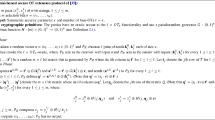Abstract
The notion of Generalized Oblivious Transfer (GOT) was introduced by Ishai and Kushilevitz (Proceeding of ISTCS97, IEEE Computer Society, pp 174–184, 1997). In a GOT protocol, Alice holds a set U of messages. A decreasing monotone collection of subsets of U defines the retrieval restrictions. Bob is allowed to learn any permissable subset of messages from that collection, but nothing else, while Alice must remain oblivious regarding the selection that Bob made. We propose a simple and efficient GOT protocol that employs secret sharing. We compare it to another secret sharing based solution for that problem that was recently proposed in Shankar et al. (Proceeding of ICDCN08, LNCS 4904, pp 304–309, 2008). In particular, we show that the access structures that are realized by the two solutions are related through a duality-type relation that we introduce here. We show that there are examples which favor our solution over the second one, while in other examples the contrary holds. Two applications of GOT are considered—priced oblivious transfer, and oblivious evaluation of multivariate polynomials.
Similar content being viewed by others
References
Aiello B., Ishai Y., Reingold O.: Priced oblivious transfer: how to sell digital goods. In: Proceeding of Eurocrypt601, LNCS 2045, pp. 119–135 (2001).
Beimel A., Tassa T., Weinreb E.: Characterizing ideal weighted threshold secret sharing. SIAM J. Disc. Math. 22, 360–397 (2008). A preliminary version appeared in The Proceeding of TCC, pp. 600–619 (2005).
Ben-Ya’akov Y.: Oblivious evaluation of multivariate polynomials and applications. M.Sc. Thesis, The Open University of Israel (2007).
Brassard G., Crépeau C., Robert J.M.: All-or-nothing disclosure of secrets. Advances in Cryptology—Crypto ’86. Lecture Notes in Computer Science (LNCS), vol. 263, pp. 234–238. Springer Verlag (1987).
Brassard G., Crépeau C., Sántha M.: Oblivious transfers and intersecting codes. IEEE Trans. Inform. Theory (special issue on coding and complexity) 42, 1769–1780 (1996)
Brickell E.F.: Some ideal secret sharing schemes. J. Combin. Math. Combin. Comput. 6, 105–113 (1989)
Even S., Goldreich O., Lempel A.: A randomized protocol for signing contracts. Commun. ACM 28, 637–647 (1985)
Fagin R., Naor M., Winkler P.: information without leaking it. Commun. ACM 39, 77–85 (1996)
Farràs O., Metcalf-Burton J.R., Padró C., Vázquez L.: On the Optimization of Bipartite Secret Sharing Schemes. In: ICITS (2009).
Gál A.: Combinatorial methods in Boolean function complexity. Ph.D. thesis, University of Chicago (1995).
Goldreich O., Vainish R.: How to solve any protocol problem: an efficiency improvement. Adv. Cryptol. (CRYPTO), LNCS. 293, 73–86 (1987)
Ishai Y., Kushilevitz E.: Private simultaneous messages protocols with applications. In: Proceeding of ISTCS97, IEEE Computer Society, pp. 174–184 (1997).
Killian J.: Founding cryptogrpahy on oblivious transfer. In: Proceeding of the 20th Annual ACM Symposium on Theory of Computing (STOC) pp. 20–31 (1988).
Mu Y., Zhang J., Varadharajan V.: m out of n oblivious transfer. ACISP 2002, LNCS, vol. 2384, pp. 395–405 (2002).
Naor M., Pinkas B.: Oblivious polynomial evaluation. In: Proceeding of the 31st Annual ACM Symposium on Theory of computing (STOC), pp. 245–254 (1999).
Naor M., Pinkas B.: Computationally secure oblivious transfer. J. Cryptol. 18, 1–35 (2005)
Rabin M.O.: How to exchange secrets by oblivious transfer. Tech. Memo TR-81, Aiken Computation Laboratory (1981).
Shankar B., Srinathan K., Pandu Rangan C.: Alternative protocols for generalized oblivious transfer. In: Proceeding of ICDCN08, LNCS, vol. 4904, pp. 304–309 (2008).
Tassa T.: Hierarchical threshold secret sharing. J. Cryptol. 20, 237–264 (2007). An earlier version appeared in Proceeding of the First Theory of Cryptography Conference, pp. 473–490 (2004).
Yao A.C.: Protocols for secure computation. In: Proceeding of IEEE Foundations of Computer Science (FOCS), pp. 160–164 (1982).
Author information
Authors and Affiliations
Corresponding author
Additional information
Communicated by P. Wild.
Rights and permissions
About this article
Cite this article
Tassa, T. Generalized oblivious transfer by secret sharing. Des. Codes Cryptogr. 58, 11–21 (2011). https://doi.org/10.1007/s10623-010-9378-8
Received:
Accepted:
Published:
Issue Date:
DOI: https://doi.org/10.1007/s10623-010-9378-8
Keywords
- Oblivious transfer
- Generalized oblivious transfer
- Multiparty computation
- Secret sharing
- Access structures




